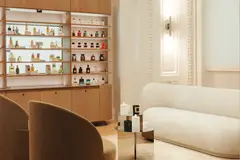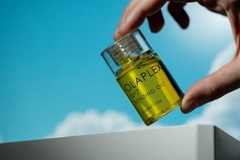Estée Lauder bets on Paris fragrance hub to speed creation and fuel recovery
Key takeaways
- Estée Lauder opens a global Fragrance Atelier in Paris, France, to boost innovation in its only growing business segment.
- The atelier uses AI, neuroscience, and molecular analysis to cut fragrance development time by up to 50%.
- The launch aligns with Estée Lauder’s strategy to restore growth after three years of sales declines.

The Estée Lauder Companies (ELC) has opened a global Fragrance Atelier in Paris, France. After three consecutive years of declining sales, the facility aims to bolster innovation in ELC’s only growing segment: fragrance.
The atelier uses an AI-enabled creation process that combines olfactive science, neuroscience modeling, and real-time patent and regulation tracking.
ELC says the system will reduce fragrance development lead times by 30–50% in the coming years, allowing brands like Jo Malone London, Le Labo, Tom Ford, and Kilian Paris to bring new scents to market faster.
“Located in the cradle of perfumery, our teams will blend state-of-the-art technology, data-driven intelligence, and olfactive expertise to craft the next generation of extraordinary scents for our consumers worldwide,” says Stéphane de La Faverie, president and CEO at ELC.
The launch comes as ELC seeks to restore growth after a US$1.13 billion loss reported for fiscal 2025.
Future-forward fragrance
The Fragrance Atelier, located within La Maison des Parfums on Rue Volney, aims to blend traditional French perfumery with “cutting-edge” science. It features spaces dedicated to experimentation, collaboration, and sensory analysis.
Inside the atelier, perfumers and brand teams work in co-creation rooms like the “Music Room,” where they “compose” and explore new scent directions.
The labs are equipped with laboratory tools such as CO2 supercritical extraction — a clean method for obtaining fragrance ingredients, like essential oils, from natural sources such as flowers, fruits, resins, or woods.
In-house teams will also conduct gas chromatography-mass spectrometry molecule analysis, which identifies and analyzes the exact molecules that make up a fragrance.
Moreover, AI-driven sillage measurement will allow scientists to understand scent structure and longevity at a molecular level.
.webp) The Fragrance Atelier aims to blend traditional French perfumery with “cutting-edge” science.ELC says its proprietary neuroscience-based consumer modeling will help fragrance creators design scents that evoke emotional responses by combining sensory data with human insight.
The Fragrance Atelier aims to blend traditional French perfumery with “cutting-edge” science.ELC says its proprietary neuroscience-based consumer modeling will help fragrance creators design scents that evoke emotional responses by combining sensory data with human insight.
Eyeing the ladder out
The Fragrance Atelier’s opening comes as Estée Lauder faces tumultuous financials. In its fiscal 2025 report in August, the company said tariff-related headwinds are forecast to reduce FY2026 profitability by approximately US$100 million.
The report also showed that almost every category fell (skin care -16%, makeup -11%, hair care -15%), except fragrance, which grew 4% thanks to brands like Le Labo and Jo Malone London.
The new atelier reflects ELC’s plan to focus on categories that show resilience while improving operational efficiency and innovation speed.
Personal Care Insights previously reported on consumers’ heightened appetite for new innovation. According to a report by Atelier and Accenture, 64% of shoppers want brands to respond faster to their needs. But, the number of “net-new” product launches has dropped to 46% in early 2024 compared to 63% in 2015.
Slow lead times are a growing challenge for beauty companies, prompting actions such as adopting alternative safety testing methods, partnering with suppliers closer to markets, and digitizing internal processes to accelerate product development.
ELC’s chief research and innovation officer, René Lammers, concludes: “This hub brings together experts from across our fragrance brands and partners in an environment purpose-built for experimentation. Together, they will accelerate the journey from inspiration to formulation and, ultimately, to the final consumer experience.”













